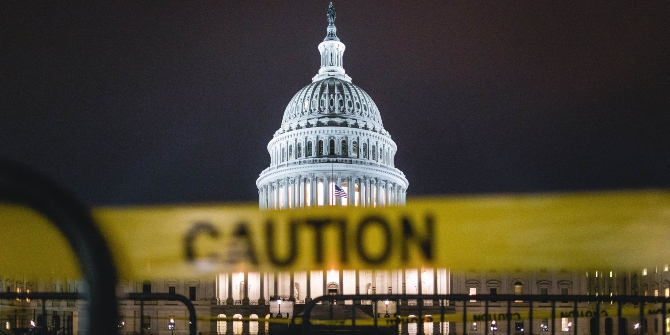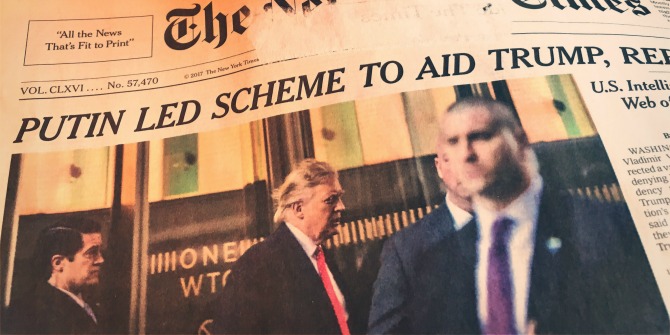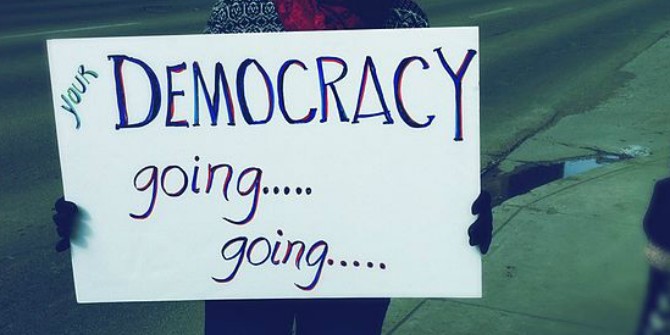
 The lead up to Donald Trump’s inauguration as president of the United States has seen the release of a dossier which claimed that he has close ties to Russia. Emily Holland and Hadas Aron write that Russia’s recent alleged involvement in US politics, from hacking the Democratic National Committee to the allegations contained in the dossier are meant to destabilize US democracy rather than to undermine specific politicians like Trump. They argue that the dossier is part of an attempt by Russia for their narrative of instability and illiberalism to become the dominant one in the international system.
The lead up to Donald Trump’s inauguration as president of the United States has seen the release of a dossier which claimed that he has close ties to Russia. Emily Holland and Hadas Aron write that Russia’s recent alleged involvement in US politics, from hacking the Democratic National Committee to the allegations contained in the dossier are meant to destabilize US democracy rather than to undermine specific politicians like Trump. They argue that the dossier is part of an attempt by Russia for their narrative of instability and illiberalism to become the dominant one in the international system.
At president-elect Donald Trump’s first press conference on January 11, his reaction to the allegations made against him in the so-called ‘Trump Dossier’ was unsurprising. Instead of trying to allay the concerns of the American people, Trump attacked the intelligence community and the media. Like other populists, Trump was elected on a wave of anti-establishment sentiment. To remain anti-establishment while in power is not a simple task. Leaders like Russian president Vladimir Putin target both real and perceived enemies at home and abroad. Another strategy is continued mobilization against “elites” and the “establishment”. Trump is doing just that by pointing the finger at the intelligence community and the media.
Beyond the security implications of Trump’s blatant disregard of allegations of foreign meddling in our elections, his actions show disdain for both formal and informal institutions. Of course, American politics has been marked by backroom deals and corrupt practices before, but in the past there was at least the appearance of a legitimate democratic process. The ‘Trump Dossier’ and his reaction to it undermine and delegitimize this process
This damaging outcome is exactly what Putin envisioned for America and for himself. Part of the way Putin consolidated power in Russia is by constructing a narrative that framed American democracy as hypocritical and corrupt, which justified his rollback of democratic practices and liberties. The purpose of all of Russia’s recent aggressive actions against the United States was not to “rig” the elections or even blackmail Trump outright, but rather to destabilize American democracy, and more important, to diminish American citizen’s trust in their democratic institutions.
In the days that followed the collapse of the Soviet Union, the western world celebrated the “end of history”, an era that finally proved liberal democracy was the best system of government. Russia was not a leading actor under these conditions because it could neither beat liberal states nor join them. Following the global economic crisis of 2008 Russia once again offers an ideological and organizational alternative to the West – illiberal populism.
Political actors around the globe have been responding to the combination of Putin’s rhetoric, material incentives, and threats. As a result, in the last decade Russia has been able to cultivate and international environment that aligns well with its interest. On the economic level, Russia’s system of oligarchs benefits from dealing with likeminded populist elites without interference of rule of law considerations. In terms of Russia’s military goals, the cautious preferences of liberals and isolationist tendency of populists after 2008 may have paved the way for Russian ambitions in both Syria and Ukraine.

The ‘Trump Dossier’ further helps create an international system in which Russia’s narrative is the dominant paradigm. Putin, a former KGB agent and head of the FSB, has, with Trump’s help, brought back a world of suspicion and intrigue. Compromising material, scandal, and competing intelligence agencies harken back to the days of the Cold War, in which the Soviet Union portrayed the West as corrupt and morally bankrupt.
Russian politics have always been characterized by a high degree of cynicism. American political rhetoric, on the other hand, has generally been highly optimistic. Bringing Russian-style cynicism to the American politics is another real danger of the ‘Trump Dossier’ and his presidency. Because the Russian people do not believe they have any control over the system or their own political destiny, they distance themselves from the political process and stop holding their government to account. This is the danger of the Trump-Putin brand of corruption, and one that American citizens should be wary of.
After assuming office, Trump’s first foreign trip will be to Iceland, for a summit with Vladimir Putin. Trump is right to seek improved relations with Moscow based on areas of mutual interest, but it is foolhardy to expect Putin to discontinue his aggressive attack on American democracy. A scandalous Trump presidency both weakens America as Putin’s adversary and strengthens his own domestic position. While Putin will not face any challenge in the upcoming 2018 elections, he will soon have to choose a political successor. America’s sullied reputation has given Putin as massive boost and positioned Russia’s successful illiberal regime as a model for export to other would-be demagogues.
With US-Russia relations once again a defining feature of international politics, it is crucial to understand how Russia’s interests are manifesting themselves in the dossier scandal. Increased corruption, disdain for formal institutions and processes, and attacks on the media and free information are all part of Russia’s plan to discredit American democracy. Trump’s dismissal of the allegations against him, as well as Russia’s brazen attempts to meddle in our elections only makes matters worse.
Despite all of these dangers, hope remains. As noted, the strength of American democracy is in its deeply entrenched optimism, and in long held traditions that give American citizens a stake in the political system. Opposing cynicism is a difficult task because it has to be done through the very democratic process that populist leaders delegitimize. But democracy does not begin and end with the presidency, and trust in democracy can and should be cultivated from the ground up.
Featured image credit: Seth Anderson (Flickr, CC-BY-NC-SA-2.0)
Please read our comments policy before commenting.
Note: This article gives the views of the author, and not the position of USApp– American Politics and Policy, nor of the London School of Economics.
Shortened URL for this post: http://bit.ly/2jFJtjE
_________________________________
 Emily Holland – Columbia University
Emily Holland – Columbia University
Emily Holland is a PhD Candidate in Political Science at Columbia University. Her research focuses on energy politics, US-Russia relations, Russian foreign policy and politics of post-Soviet states. She has held visiting research appointments at the European Council of Foreign Relations and the German Institute for Economic Research. Emily blogs at Commenting Together.
 Hadas Aron – Columbia University
Hadas Aron – Columbia University
Hadas Aron is a PhD Candidate in Political Science at Columbia University. Her research focuses on right wing populism and nationalism with a regional focus on Eastern Europe, the United States, and Israel. She held visiting appointments at the Central European University and the Hungarian Academy of Science. Aron blogs at Commenting Together.






